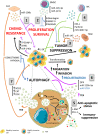Autophagy-Mediated Exosomes as Immunomodulators of Natural Killer Cells in Pancreatic Cancer Microenvironment
- PMID: 33680945
- PMCID: PMC7933474
- DOI: 10.3389/fonc.2020.622956
Autophagy-Mediated Exosomes as Immunomodulators of Natural Killer Cells in Pancreatic Cancer Microenvironment
Abstract
Pancreas ductal adenocarcinoma is a highly aggressive cancer with an incredible poor lifespan. Different chemotherapeutic agents' schemes have been tested along the years without significant success. Furthermore, immunotherapy also fails to cope with the disease, even in combination with other standard approaches. Autophagy stands out as a chemoresistance mechanism and is also becoming relevant as responsible for the inefficacy of immunotherapy. In this complex scenario, exosomes have emerged as a new key player in tumor environment. Exosomes act as messengers among tumor cells, including tumor microenvironment immune cells. For instance, tumor-derived exosomes are capable of generating a tolerogenic microenvironment, which in turns conditions the immune system behavior. But also, immune cells-derived exosomes, under non-tolerogenic conditions, induce tumor suppression, although they are able to promote chemoresistance. In that way, NK cells are well known key regulators of carcinogenesis and the inhibition of their function is detrimental for tumor suppression. Additionally, increasing evidence suggests a crosstalk between exosome biogenesis and the autophagy pathway. This mini review has the intention to summarize the available data in the complex relationships between the autophagy pathway and the broad spectrum of exosomes subpopulations in pancreatic cancer, with focus on the NK cells response.
Keywords: autophagy; exosomes; natural killer cells; pancreatic cancer; tumor microenvironment.
Copyright © 2021 Papademetrio, Garcia, Grasso and Alvarez.
Conflict of interest statement
The authors declare that the research was conducted in the absence of any commercial or financial relationships that could be construed as a potential conflict of interest.
Figures

Similar articles
-
MicroRNA analysis of Natural Killer cell-derived exosomes: the microRNA let-7b-5p is enriched in exosomes and participates in their anti-tumor effects against pancreatic cancer cells.Oncoimmunology. 2023 Jun 7;12(1):2221081. doi: 10.1080/2162402X.2023.2221081. eCollection 2023. Oncoimmunology. 2023. PMID: 37304055 Free PMC article.
-
Cancer cell's internal and external warriors: Autophagosomes and exosomes.Life Sci. 2022 Jul 1;300:120552. doi: 10.1016/j.lfs.2022.120552. Epub 2022 Apr 19. Life Sci. 2022. PMID: 35452638 Review.
-
The Role of Exosomes in Pancreatic Ductal Adenocarcinoma Progression and Their Potential as Biomarkers.Cancers (Basel). 2023 Mar 15;15(6):1776. doi: 10.3390/cancers15061776. Cancers (Basel). 2023. PMID: 36980662 Free PMC article. Review.
-
Saliva exosomes from pancreatic tumor-bearing mice modulate NK cell phenotype and antitumor cytotoxicity.FASEB J. 2017 Mar;31(3):998-1010. doi: 10.1096/fj.201600984R. Epub 2016 Nov 28. FASEB J. 2017. PMID: 27895106 Free PMC article.
-
Bioactivity of Exosomes Derived from Trained Natural Killer Cells versus Non-Trained One: More Functional and Antitumor Activity.Biomed Res Int. 2022 Aug 24;2022:5396628. doi: 10.1155/2022/5396628. eCollection 2022. Biomed Res Int. 2022. PMID: 36060136 Free PMC article.
Cited by
-
Therapeutic Aspects and Molecular Targets of Autophagy to Control Pancreatic Cancer Management.Biomedicines. 2022 Jun 20;10(6):1459. doi: 10.3390/biomedicines10061459. Biomedicines. 2022. PMID: 35740481 Free PMC article. Review.
-
PDAC, the Influencer Cancer: Cross-Talk with Tumor Microenvironment and Connected Potential Therapy Strategies.Cancers (Basel). 2023 May 26;15(11):2923. doi: 10.3390/cancers15112923. Cancers (Basel). 2023. PMID: 37296886 Free PMC article. Review.
-
Evaluation of a three-gene methylation model for correlating lymph node metastasis in postoperative early gastric cancer adjacent samples.Front Oncol. 2024 Oct 17;14:1432869. doi: 10.3389/fonc.2024.1432869. eCollection 2024. Front Oncol. 2024. PMID: 39484038 Free PMC article.
-
Exosomes as novel tools for renal cell carcinoma therapy, diagnosis, and prognosis.Heliyon. 2024 Jun 13;10(12):e32875. doi: 10.1016/j.heliyon.2024.e32875. eCollection 2024 Jun 30. Heliyon. 2024. PMID: 38948044 Free PMC article. Review.
-
MicroRNA-enriched exosome as dazzling dancer between cancer and immune cells.J Physiol Biochem. 2024 Nov;80(4):811-829. doi: 10.1007/s13105-024-01050-x. Epub 2024 Sep 24. J Physiol Biochem. 2024. PMID: 39316240 Review.
References
-
- Verslype C, Van Cutsem E, Dicato M, Cascinu S, Cunningham D, Diaz-Rubio E, et al. . The management of pancreatic cancer. Current expert opinion and recommendations derived from the 8th World Congress on Gastrointestinal Cancer, Barcelona, 2006. Ann Oncol (2007) 18:1–10. 10.1093/annonc/mdm210 - DOI - PubMed
-
- Papademetrio DL, Lompardía SL, Simunovich T, Costantino S, Mihalez CY, Cavaliere V, et al. . Inhibition of Survival Pathways MAPK and NF-kB Triggers Apoptosis in Pancreatic Ductal Adenocarcinoma Cells via Suppression of Autophagy. Target Oncol (2016) 11:183–95. 10.1007/s11523-015-0388-3 - DOI - PubMed
Publication types
LinkOut - more resources
Full Text Sources
Other Literature Sources

